How can I improve my content’s search engine rankings? It’s a question all marketing experts ask and now it’s one that can be answered: with data-driven content optimization. While the success of online content used to be largely left to chance, it is now possible to impact results in a sustainable and targeted manner. From research and writing, all the way up to publication – every step of the content process can be tailored to meet the demands of search engine algorithms. Read on to learn why your content marketing should be data-driven.
Great text, no traffic. Just bad luck?
Cathy works as a content marketing manager for a recruiting company. Her team values her creativity and her writing ability, and her clients rely on her strong expert knowledge. Cathy’s articles are always full of useful tips for job applicants and insider knowledge about the current job market.
After publishing her latest blog post “How to perform in a job interview”, Cathy uses Google Analytics to measure the success of her article. After two weeks, she sees that her article has only been read twice.
“That’s odd,” thinks Cathy. It seems particularly strange, as our ambitious author isn’t just a talented writer, but she also understands some SEO fundamentals and was careful to include relevant keywords in her text. Cathy decides that perhaps “good things come to those who wait”, but after two more weeks, not much has happened in terms of page views. So what went wrong?
Quite simply: If content is supposed to perform, then it has to be data-driven.
But what is data-driven content?
Data-driven content is developed with a clear goal in mind and incorporates data into the creation and optimization processes. Data is gathered from search engine rankings and page content of successful competitor websites. Search engines like Google, whose database includes 600 million search queries, 130 million domains, 20 billion rankings and 250 billion data points, aim to understand user intent and user behavior. By including ranking data in content creation, the content can be better tuned to the search engine rankings, and success is made predictable before publication.
The Searchmetrics Content Experience pulls data from an enormous search database (the biggest in the world after Google’s own), and intelligently analyzes what users want. This makes it possible to create content that meets the needs and expectations of your target audience.
7 Advantages of Integrated Data
In the following, we will explain the seven advantages of data-driven content creation, and we will show how the Searchmetrics Content Experience helps you leverage this data for maximum impact.
1. You know your audience
When you create content, you should define precisely what the problem is, and which solution is being offered to the reader. Search engines like Google are interested in providing their users with concrete answers. Understanding the search intent is a big part of this. If a user searches for “content optimization SEO”, then Google will rank pages at the top that provide a suitable answer on this problem.
How do I know what the user’s intentions are or what problem he is trying to solve whilst looking for these terms?
The Searchmetrics Content Experience Suite shows you the search intent behind particular topics. This means you can be sure you are giving your target audience the answers they need.
If you look at “content optimization SEO” in the Searchmetrics Search Experience Topic Explorer, you instantly see which topics are most closely related to it. You can use these to help decide what to include in your content.
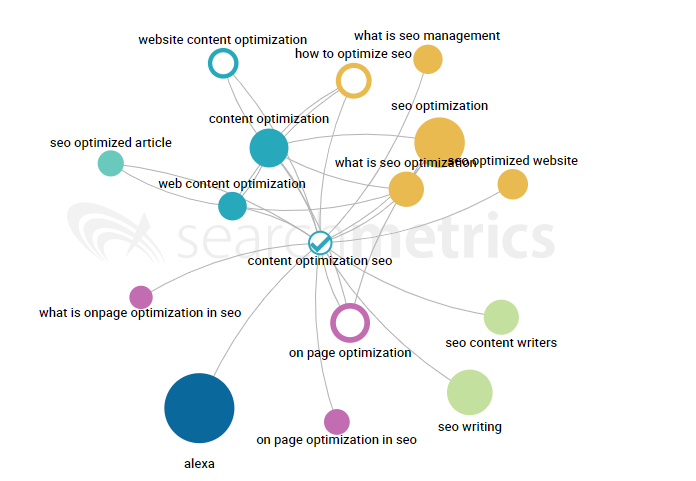
Cathy also benefits from this feature. If she wants to write about a job interview, she can analyze the topic and find out what users want to know. If her article can give precise answers to users’ questions, it will improve its chance of achieving high rankings.
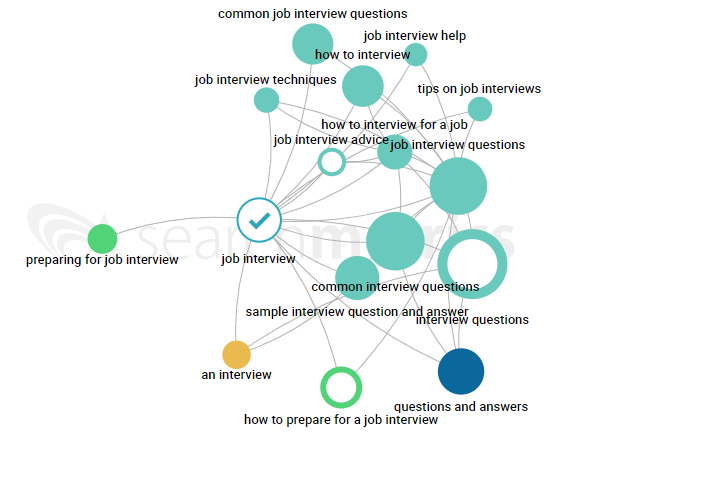
2. You’re in the right place at the right time
When considering when to publish a piece of content, you need to think strategically. When do people search for which topics most often? Sometimes the seasonality of the publishing date appear to be obvious, sometimes a bit hidden.
Most topics, like Cathy’s, don’t have obvious seasonality. What’s the best time to post an article with job interview tips and tricks? How large is the search volume at different times of year and which sub-topics are relevant for users?
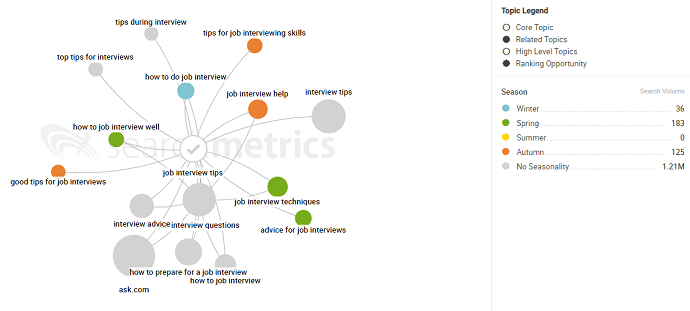
Cathy wants to give useful advice to applicants in her article about “How to convince in an interview”. To check the seasonality, she can first select the topic “tips for the interview” and click on the respective bubble to get a detailed topic overview. Here, Cathy can review that her search term has the best SEO visibility in March.
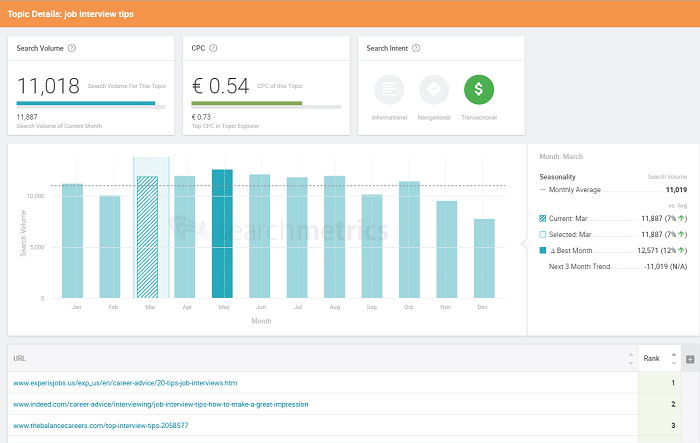
3. You understand your competition
To always stay one step ahead of the competition, you first have to know who your competition is and exactly what they are doing. How are your competitors generating traffic? If they have URLs covering topics relevant to the content of your page, then these will show up in the Google search results.
In a couple of seconds, the Searchmetrics Content Experience calculates the similarities of successful content of competitors and generates targets that you can measure your content against. In this way, you are receiving a prefabricated competitor analysis which provides you a strategic advantage.
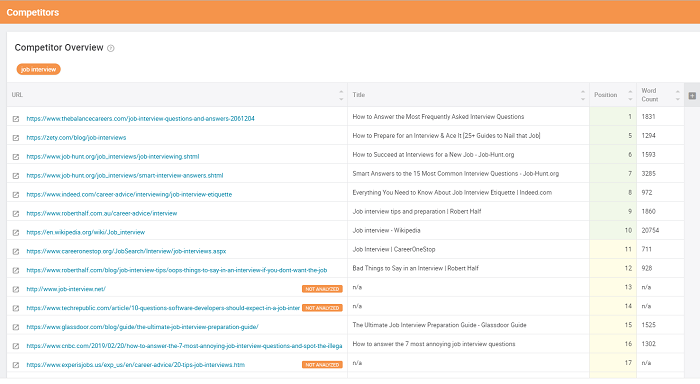
4. You can answer the questions people are asking
Readers who are interested in a particular topic normally want to find qualified information. Cathy’s target audience would like to find a new job or improve their current job situation. However, sometimes readers will be interested in other topics that they are not yet aware of.
The Searchmetrics Content Experience shows you which questions on the topic have been asked in online forums. This helps you create a clear audience profile and understand the interests of your readers better.
If Cathy is writing about job interviews, then she can assess the questions that internet users are already asking about this topic.
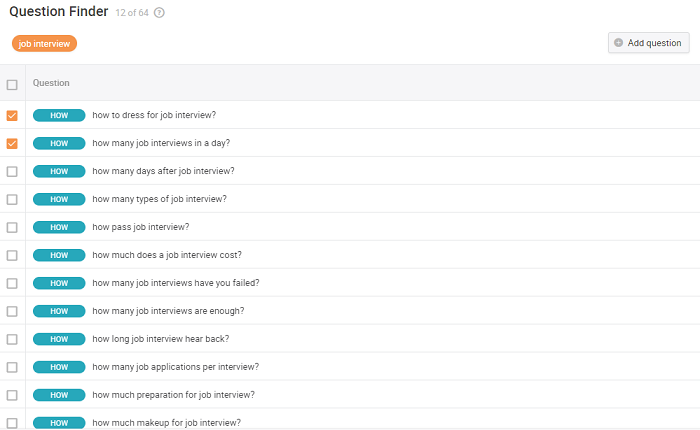
5. Your workflows are standardized
Creating content isn’t just about the words on a page, but also the processes that go into it. Does the author know what their goals are? When is the copy deadline and when should the piece go live?
The Searchmetrics Content Experience creates efficient workflows, from strategy and planning to content creation. This includes a standardized submission and approval process that guarantees a high level of readability for your target audience, whilst also meeting SEO demands. The systems also allow for multiple authors to work on one text based on the same brief.
6. Your editor gives you real-time feedback
Many marketing departments employee an editor to read draft texts and to check their quality and correctness.
The Searchmetrics Content Experience includes an editor that indicates whether a text is well-written, has the right length and fulfils SEO criteria. Real-time input while you write leads to huge time savings as the content does not have to be rewritten – the first draft has already been edited during its creation. This feature also allows multiple editing of the text design. For example, Cathy and her colleagues can work simultaneously on her job interview article without interrupting the workflow or overlooking an important step within the process.
7. You can track your content performance
According to the Content Marketing Institute (CMI), only 43% of marketers say they know whether their content is successful. Just like Cathy, many people publish articles by only evaluating their success in Google Analytics. Here we can see if the article is reaching its desired target and how it performs but not why we have those results.
With the Searchmetrics Content Experience, you can find out how your content is performing. The success of your content can be tracked, and opportunities for optimization can be revealed.
Are you ready for your personal content optimization?
Request a demo and discover the world of data-driven content optimization! The Searchmetrics Content Experience is your SEO and content software, providing data analysis and recommendations to increase your online visibility, relevance and user engagement.
